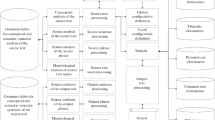Abstract
This paper proposes a variation of synchronous grammar based on the formalism of context-free grammar by generalizing the first component of productions that models the source text, named Constraint-based Synchronous Grammar (CSG). Unlike other synchronous grammars, CSG allows multiple target productions to be associated to a single source production rule, which can be used to guide a parser to infer different possible translational equivalences for a recognized input string according to the feature constraints of symbols in the pattern. Furthermore, CSG is augmented with independent rewriting that allows expressing discontinuous constituents in the inference rules. It turns out that such grammar is more expressive to model the translational equivalences of parallel texts for machine translation, and in this paper, we propose the use of CSG as a basis for building a machine translation (MT) system for Portuguese to Chinese translation.
Preview
Unable to display preview. Download preview PDF.
Similar content being viewed by others
References
Rambow, O., Satta, G.: Synchronous Models of Language. In: Proceedings of 34th Annual Meeting of the Association for Computational Linguistics, Santa Cruz, California, USA, pp. 116–123. Morgan Kaufmann, San Francisco (1996)
Lewis, P.M., Stearns, R.E.: Syntax-directed transduction. Journal of the Association for Computing Machinery 15(3), 465–488 (1968)
Shieber, S.M., Schabes, Y.: Synchronous Tree Adjoining Grammar. In: Proceedings of the 13th International Conference on Computational Linguistic, Helsinki (1990)
Seki, H., Matsumura, T., Fujii, M., Kasami, T.: On multiple context-free grammars. Theoretical Computer Science 88(2), 191–229 (1991)
Melamed, I.D.: Multitext Grammars and Synchronous Parsers. In: Proceedings of NAACL/HLT 2003, Edmonton, pp. 79–86 (2003)
Wong, F., Hu, D.C., Mao, Y.H., Dong, M.C.: A Flexible Example Annotation Schema: Translation Corresponding Tree Representation. In: Proceedings of the 20th International Conference on Computational Linguistics, Switzerland, Geneva, pp. 1079–1085 (2004)
Wu, D.: Grammarless extraction of phrasal translation examples from parallel texts. In: Proceedings of TMI-1995, Sixth International Conference on Theoretical and Methodological Issues in Machine Translation, v2, Leuven Belgium, 354–372 (1995)
Aho, A.V., Ullman, J.D.: Syntax Directed Translations and the Pushdown Assembler. Journal of Computer and System Sciences 3, 37–56 (1969)
Melamed, I.D., Satta, G., Wellington, B.: Generalized Multitext Grammars. In: Proceedings of 42th Annual Meeting of the Association for Computational Linguistics, Barcelona, Spain, pp. 661–668 (2004)
Kaplan, R.M., Bresnan, J.: Lexical-Functional Grammar: A Formal System for Grammatical Representation. In: Bresnan, J. (ed.) The Mental Representation of Grammatical Relations, pp. 173–281. MIT Press, Cambridge (1982)
Kaplan, R.M.: The Formal Architecture of Lexical-Functional Grammar. Information Science and Engineering 5, 30–322 (1989)
Wong, F., Mao, Y.H.: Framework of Electronic Dictionary System for Chinese and Romance Languages. Automatique des Langues (TAL) 44(2), 225–245 (2003)
Wong, F., Mao, Y.H., Dong, Q.F., Qi, Y.H.: Automatic Translation: Overcome the Barriers between European and Chinese Languages. In: Proceedings (CD Version) of First International UNL Open Conference, SuZhou China (2001)
Pollard, C., Sag, I.: Head-Driven Phrase Structure Grammar. University of Chicago Press, Chicago (1994)
Ide, N., Veronis, J.: Word Sense Disambiguation: The State of the Art. Computational Linguistics 24(1), 1–41 (1998)
Earley, J.: An Efficient Context-Free Parsing Algorithm. CACM 13(2), 94–102 (1970)
Tomita, M.: Computational Linguistics, 13(1-2), 31–46 (1987)
Aho, A.V., Sethi, R., Ullman, J.D.: Compiler: Principles, Techniques and Tools. Addison-Wesley, Reading (1986)
Hutchins, W.J., Somers, H.L.: An Introduction to Machine Translation. Academic Press, London (1992)
Author information
Authors and Affiliations
Editor information
Editors and Affiliations
Rights and permissions
Copyright information
© 2005 Springer-Verlag Berlin Heidelberg
About this paper
Cite this paper
Wong, F., Hu, DC., Mao, YH., Dong, MC., Li, YP. (2005). Machine Translation Based on Constraint-Based Synchronous Grammar. In: Dale, R., Wong, KF., Su, J., Kwong, O.Y. (eds) Natural Language Processing – IJCNLP 2005. IJCNLP 2005. Lecture Notes in Computer Science(), vol 3651. Springer, Berlin, Heidelberg. https://doi.org/10.1007/11562214_54
Download citation
DOI: https://doi.org/10.1007/11562214_54
Publisher Name: Springer, Berlin, Heidelberg
Print ISBN: 978-3-540-29172-5
Online ISBN: 978-3-540-31724-1
eBook Packages: Computer ScienceComputer Science (R0)




